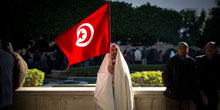Tunisia: West could scupper genuine democracy with 'Islamic alternative'

Samir Amin discusses the Tunisian uprising and the country’s prospects for building ‘a democratic government supported by the people’, in an interview with Aydinlik Magazine.
Professor Samir Amin, respected political thinker, economist and writer, evaluates developments in Tunisia in an interview with Aydinlik Magazine. We also asked Samir Amin his views about Hu Jintao’s visit to USA and currency policy of the China. We present a broad summary of the interview with Amin, who answered our questions from Dakar by telephone.
POPULAR MOVEMENT
AYDINLIK: How do you interpret the movement in Tunisia?
SAMIR AMIN: The events of Tunisia must be interpreted as a very powerful popular movement uprising, a general uprising. About 80 per cent of the population of the country in many areas including in the capital were out in the streets for 45 days and continue to do so. They carried on their protests in spite of the repression and did not give up. This movement has political, societal and economic dimensions. Ben Ali regime was one of the most repressive police regimes in the world. Thousands of people in Tunisia were assassinated, arrested and tortured, but Western powers best friend never allowed these facts to be known. The Tunisian people want democracy, respect of rights.
Economic and social factors were also influential in the uprising of the people. The country experiences rapidly escalating unemployment, particularly of youth, including educated young people. The standard of living of the majority of the population is decreasing, in spite of the growth of the GDP praised by World Bank and international Agencies. Growing inequality explains it. The influence of the mafia type of organisation is also another important factor. The system was managed to the almost exclusive benefit of the Ben Ali family and its organisation.
There is another aspect of the movement that is very interesting. The Islamic influence was not effective in the uprising. Tunisia is really a secular country. People manage to keep religion and politics separate. This is very important and positive. It was said Ben Ali protected the country from fundamentalist Muslims. He used this argument very effectively for many years. Actually it wasn’t Ben Ali but the people that protected the country from fundamentalists.
The fact that the army wasn’t against the people gave strength to the people in the streets. The Ben Ali government gave support and financial aid to the police not the army. This is why the police played such an important role in the suppression of the events in the past.
IT IS NOT EASY TO ESTABLISH A DEMOCRATIC AND SECULAR REGIME IN TUNISIA
AYDINLIK: Who or which power leading this movement?
AMIN: I want to emphasise again this movement doesn’t belong to a particular group of people. This is a popular general movement. There are no foreign countries or groups behind it. It is social in essence. However it must be said that the Western powers will try to create an Islamic alternative and will try to support a movement of this sort in order to avoid a really democratic alternative. They already have started to do it, re introducing in the country the language of ‘Saudi Arabia’ as some commentators of the Tunisian people have already said.
It is very difficult to try to guess what the future holds for the country. For sure the establishment of a democratic and secular regime is not easy. Assuming the best – that is a democratic government supported by the people – (and that is not absolutely guaranteed), such a government will be confronted with the economic and social challenge: How to associate this democratisation of the political management with social progress? That is not easy. Tunisia’s ‘success’ for some time was based on three sources: The delocalisation of some light industries from Europe, tourism, mass out migration to Libya and Europe. Now those three channels have reached their ceiling and even start to be reversed. By which macro policy they could be replaced? Not easy to imagine for a small country, vulnerable and with little resources (no oil!). Solidarity and South-South cooperation might turn to be vital for an alternative. The Western powers will do all they can to have the democratic regime unsuccessful in this respect, and create therefore conditions favourable for a false ‘Islamic alternative’, labelled ‘moderate’.
CHINA NEVER GİVE UP ITS POLICIES
AYDINLIK: China President Hu Jintao met with Obama in Washington. Before going to USA, Hu Jintao said that the ‘system dominated by dollar is the product of past’. What is your opinion?
AMIN: China may smile towards the Americans but the will never compromise their policies. The winner of the Hu Jintao-Obama meeting was Hu Jinto, as was expected. China did not make any concession with respect to their independent management of their currency, the yuan. The life expectancy of the dollar that rules the international monetary system will come to an end, sooner or later. Chinese are well aware of this. Yet for the time being China doesn’t suggest to create a different alternative global currency (Chinese understand that this is not mature and therefore remains an illusion). China is concentrating at the moment on developing relatively free and independent regional alliances. China will struggle for such realistic possible answers to the challenge: Reinforcing regional agreements in Asia and Latin America, not on a global level.
BROUGHT TO YOU BY PAMBAZUKA NEWS
* This is a translation of an article that first appeared in Aydinlik Magazine.
* Samir Amin is director of the Third World Forum and chair of the World Forum for Alternatives
* Please send comments to [email protected] or comment online at Pambazuka News.
